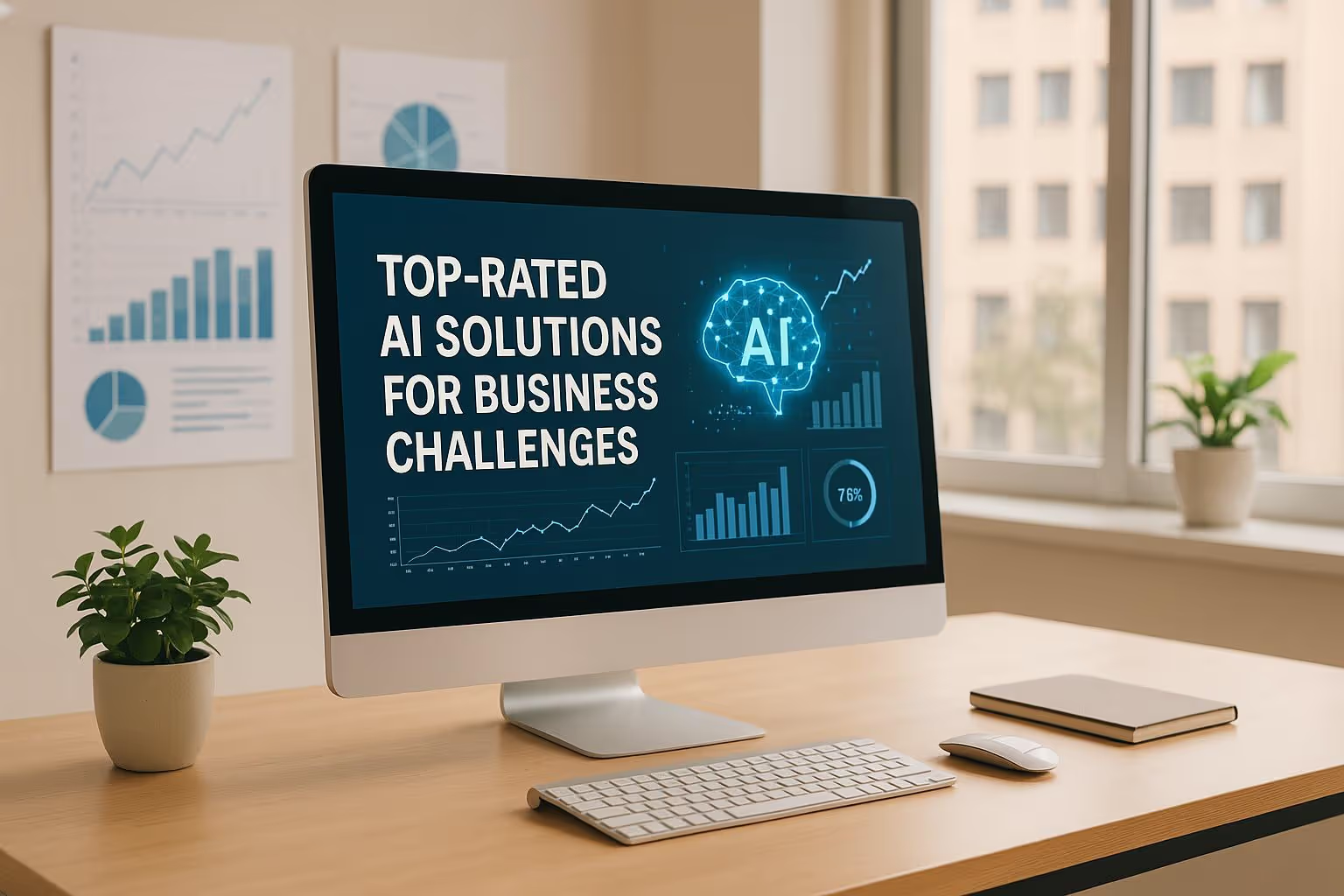
Businesses face challenges like fragmented tools, high costs, and governance issues when adopting AI. This guide highlights 10 top-rated AI solutions that address these problems by streamlining workflows, improving efficiency, and reducing expenses. From platforms that unify AI models to tools for automating data pipelines, these solutions are tailored for U.S. businesses to enhance operations while maintaining security and compliance.
These tools are designed to save time, simplify management, and provide measurable results across industries like retail, healthcare, and finance. Whether you're looking to consolidate AI models, automate workflows, or improve decision-making, there's a solution to fit your needs.
| Platform | Key Features | Pricing (USD) | Best For |
|---|---|---|---|
| Prompts.ai | Unified LLMs, cost controls, enterprise security | $0-$129/member/month | AI orchestration, cost savings |
| Domo | Real-time analytics, AI insights | From $83/user/month | Business intelligence |
| Prefect | Workflow automation, Python-native | From $39/user/month | Data pipeline automation |
| Metaflow | ML lifecycle management, versioning | Free (open source) | Machine learning workflows |
| Kubeflow | Kubernetes-native ML, pipelines | Free (open source) | ML operations |
| Ray Serve | Scalable model serving, auto-scaling | Free (open source) | Model serving |
| Diaflow | Drag-and-drop AI workflows | Freemium, $29+/month | Workflow creation |
| Apache Airflow | Task scheduling, workflow orchestration | Free (open source) | Data orchestration |
| Vue.ai | Retail AI, document processing | From $10,000/month | Retail, eCommerce |
| DataRobot | AutoML, predictive analytics | From $50,000/year | Machine learning automation |
These platforms empower businesses to overcome AI adoption hurdles, streamline operations, and maximize value. Dive into the full article to find the best fit for your organization.
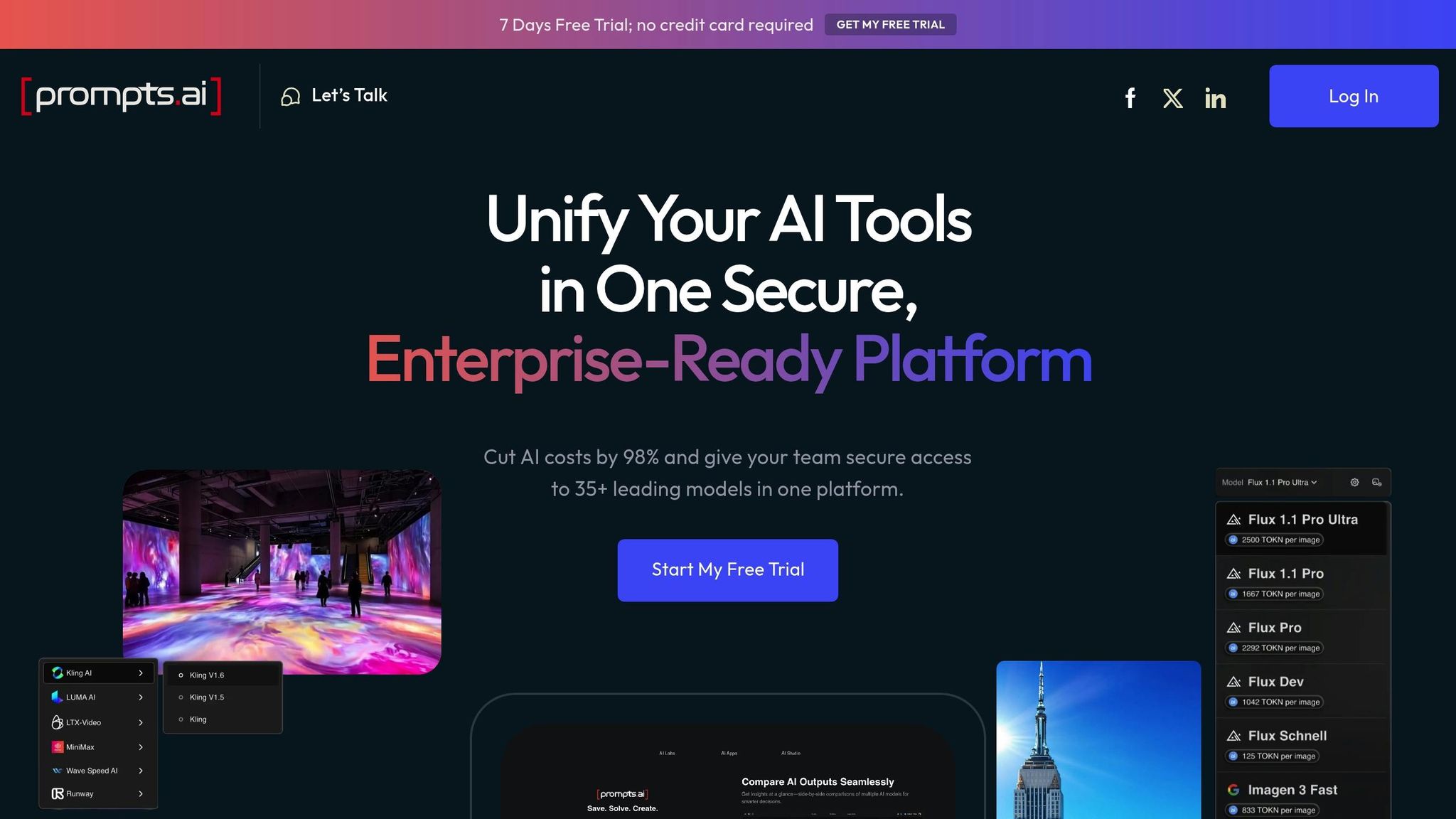
Prompts.ai brings together 35+ large language models into one secure and unified platform, addressing common hurdles like tool sprawl, hidden fees, and governance challenges that often hinder AI adoption.
This platform integrates top-tier models such as GPT-4, Claude, LLaMA, and Gemini, all accessible under a single subscription. By doing so, it eliminates the need for multiple accounts and allows teams to compare model performance side-by-side. This streamlined setup helps users choose the most effective model for any given task.
With real-time financial operations cost controls, organizations gain full transparency over their AI spending. The platform tracks token usage, monitors costs across teams and projects, and connects AI expenses directly to business outcomes, enabling finance teams to manage budgets more effectively.
Prompts.ai also features a built-in community and certification program for prompt engineers. This initiative opens the door to expertly designed workflows and equips teams with structured training to build internal AI expertise.
For businesses handling sensitive data, the platform offers enterprise-grade security and compliance. It includes detailed audit trails and governance controls that meet the rigorous standards expected by Fortune 500 companies, ensuring data remains protected throughout AI operations.
These features enable teams across various departments to integrate AI into their workflows effortlessly.
Thanks to its consolidated design, Prompts.ai supports a wide range of applications across industries like marketing, research and development (R&D), and customer service.
Marketing teams use the platform to maintain consistent brand messaging across campaigns. Instead of creating prompts from scratch, they can use standardized templates that ensure brand voice and quality remain intact.
In R&D, the side-by-side model comparison feature allows teams to test hypotheses and evaluate which models perform best for tasks like technical documentation, coding, or data analysis.
For customer service teams, the platform helps standardize response quality while preserving a personal touch. Predefined workflows handle common inquiries efficiently, while responses can still be tailored to individual customer needs.
These capabilities translate into tangible improvements in operational efficiency for businesses.
Prompts.ai delivers clear advantages for US companies seeking to optimize their AI strategies.
Prompts.ai offers flexible pricing plans tailored to different needs:
Personal Plans:
Business Plans:
For businesses with variable AI usage, the pay-as-you-go TOKN credit system ensures they only pay for what they use, eliminating unnecessary monthly fees and aligning costs with actual consumption.

Domo brings together cloud analytics and AI insights in a single platform, addressing the challenge of fragmented data sources that often leave decision-makers with incomplete information. Its suite of integrated features ensures seamless data management and actionable insights.
Domo's cloud-native architecture connects to over 1,000 data sources, eliminating the need for lengthy data warehousing setups. The platform processes information in real-time, enabling teams to make decisions based on the most current data available.
With its AI and machine learning capabilities, Domo automatically identifies metric anomalies and suggests immediate actions. Smart alerts notify teams of opportunities or potential issues before they escalate, while the system continuously adapts to user behavior to improve its recommendations.
The platform's mobile-first design and collaborative tools allow users to access dashboards, share insights, comment on data, and assign tasks - all from any location. This ensures teams can act quickly without needing to switch between multiple applications.
Domo’s features are tailored to address challenges across various industries, providing targeted solutions.
In manufacturing, Domo helps monitor production efficiency across multiple facilities. By consolidating data from equipment sensors, quality control systems, and inventory tools, the platform offers a complete view of operations. Plant managers can pinpoint bottlenecks and allocate resources more effectively.
Retail businesses rely on Domo for real-time sales performance tracking. Store managers receive instant alerts when sales targets are at risk, enabling them to adjust staffing or implement promotional campaigns on the fly. By integrating point-of-sale data with weather forecasts, local events, and historical patterns, the platform provides valuable context for performance fluctuations.
In healthcare, Domo supports efforts to improve patient outcomes by analyzing treatment trends and resource utilization. Hospital administrators can monitor metrics like bed occupancy, emergency room wait times, and staff productivity, ensuring better patient care while managing costs efficiently.
These examples highlight how Domo enhances operational efficiency and empowers decision-making for businesses across the United States.
Domo offers clear advantages that help American companies improve their operations and decision-making processes.
Domo offers flexible subscription plans designed to meet the needs of businesses of all sizes:
Additionally, Domo provides consumption-based pricing for data storage and processing. This allows businesses to scale costs based on actual usage, avoiding unnecessary expenses for unused capacity.

Prefect simplifies the management of workflows and data pipelines, making it easier for businesses to scale and handle intricate data processes.
Prefect automates repetitive workflow tasks and offers flexible deployment options, supporting both cloud-based and on-premises environments. Its ability to adjust workflows in real time ensures operations can keep pace with changing demands.
This automation minimizes the need for manual intervention and keeps workflows running smoothly, even as requirements shift.
By automating interconnected data tasks, Prefect ensures reliable processing and supports growth without adding complexity. Its focus on automation and adaptability helps businesses maintain operational consistency while efficiently scaling their data operations. This is especially valuable for U.S. companies looking to optimize resource use and streamline processes.
Explore Prefect's official resources to learn more about its latest features and pricing options.
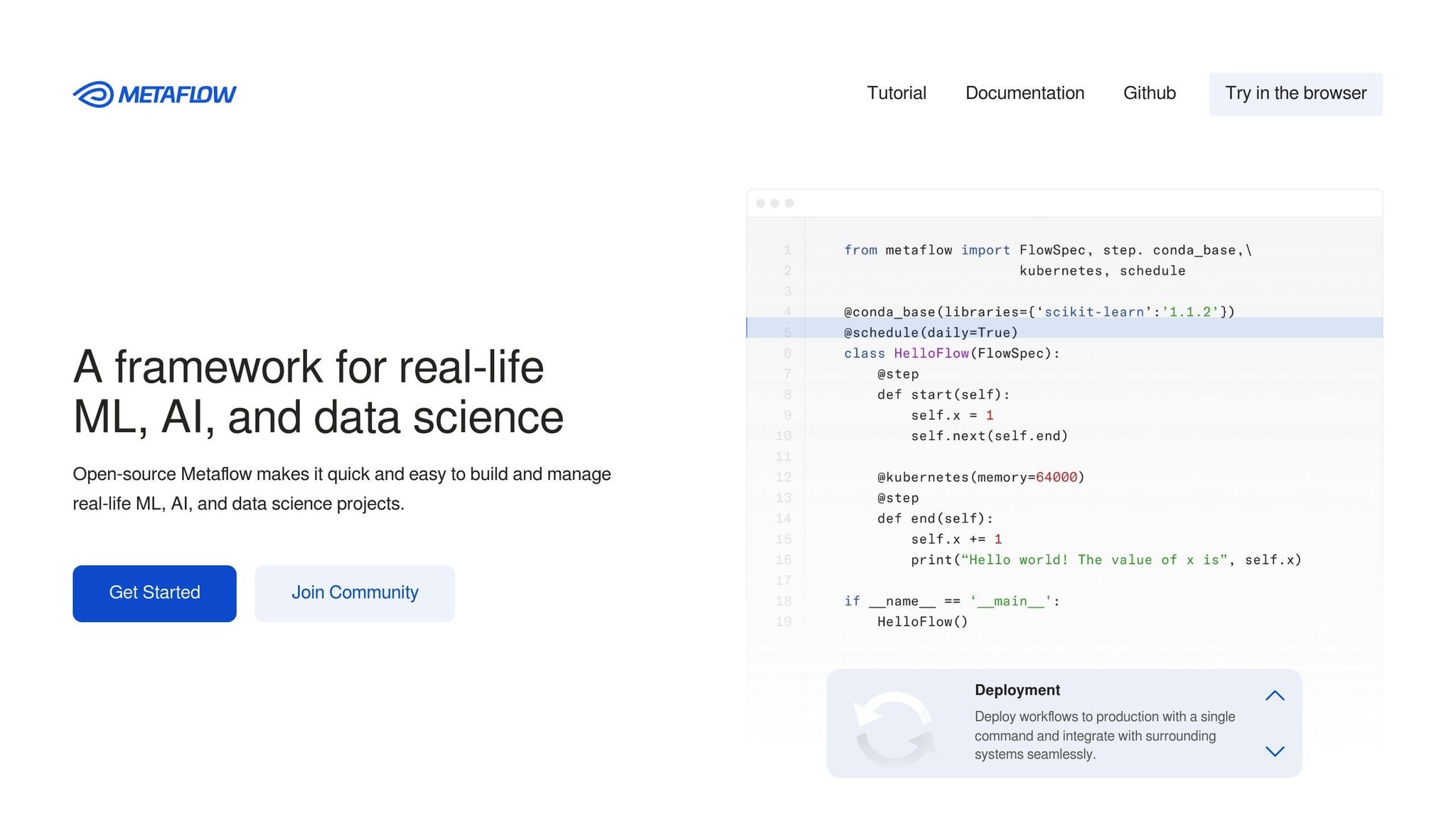
Metaflow simplifies the development and deployment of machine learning workflows, allowing data scientists to create production-ready AI systems without being bogged down by infrastructure challenges.
Metaflow is designed to make AI model development more efficient and manageable.
Metaflow is particularly effective in handling complex, data-intensive use cases:
Metaflow offers specific advantages tailored to the needs of American enterprises:
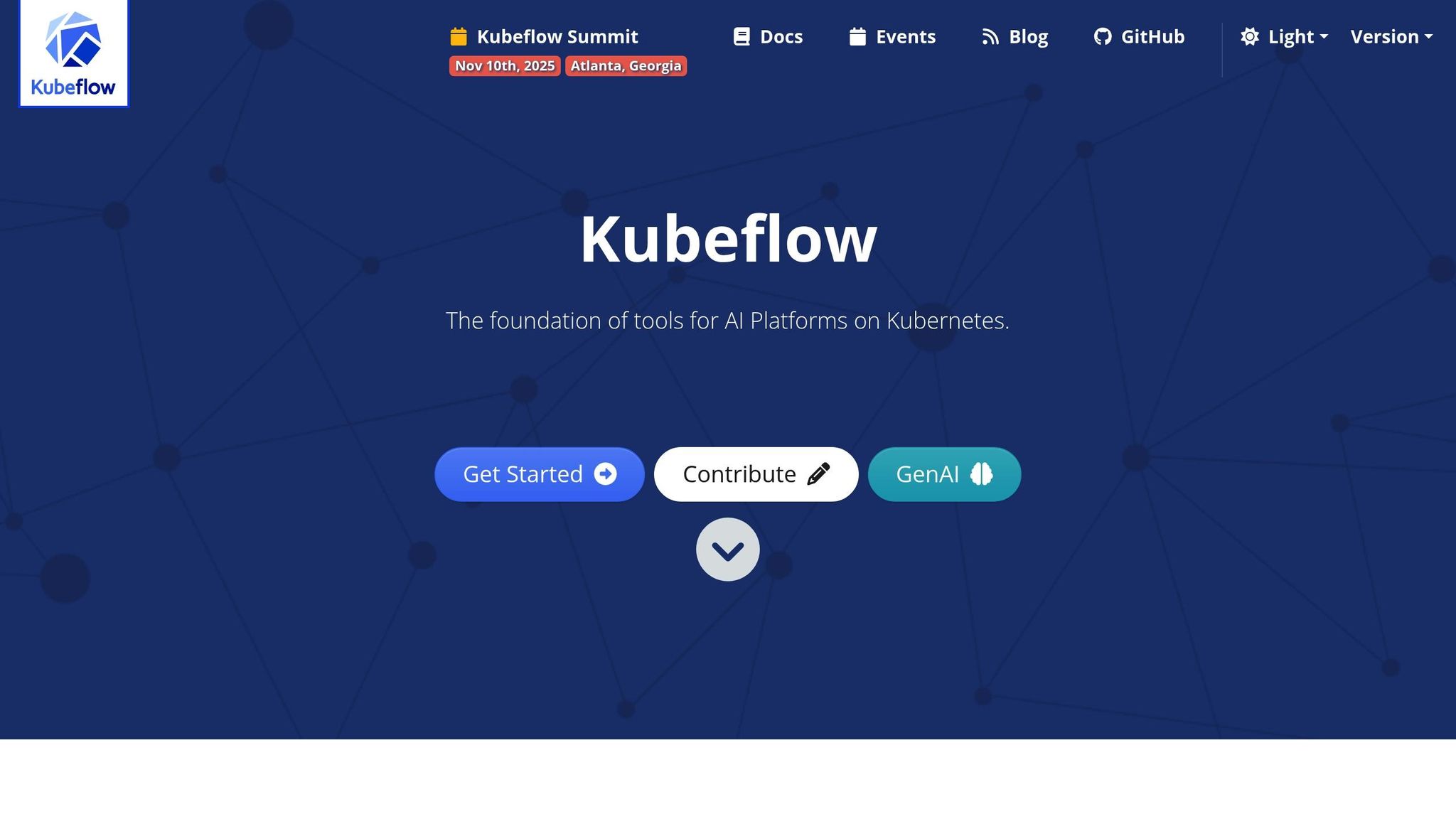
Kubeflow is an open-source platform that simplifies managing machine learning (ML) workflows on Kubernetes. It’s designed to assist organizations in deploying, managing, and scaling AI models in production environments.
Kubeflow offers a suite of tools tailored to enterprise ML operations:
These tools provide a solid framework for tackling a wide range of industry challenges.
Kubeflow is ideal for handling complex AI workflows in various sectors:
Kubeflow brings several advantages to businesses operating in the United States:
As an open-source platform, Kubeflow is free from licensing fees. However, additional expenses may arise from cloud infrastructure, third-party support, and implementation services.
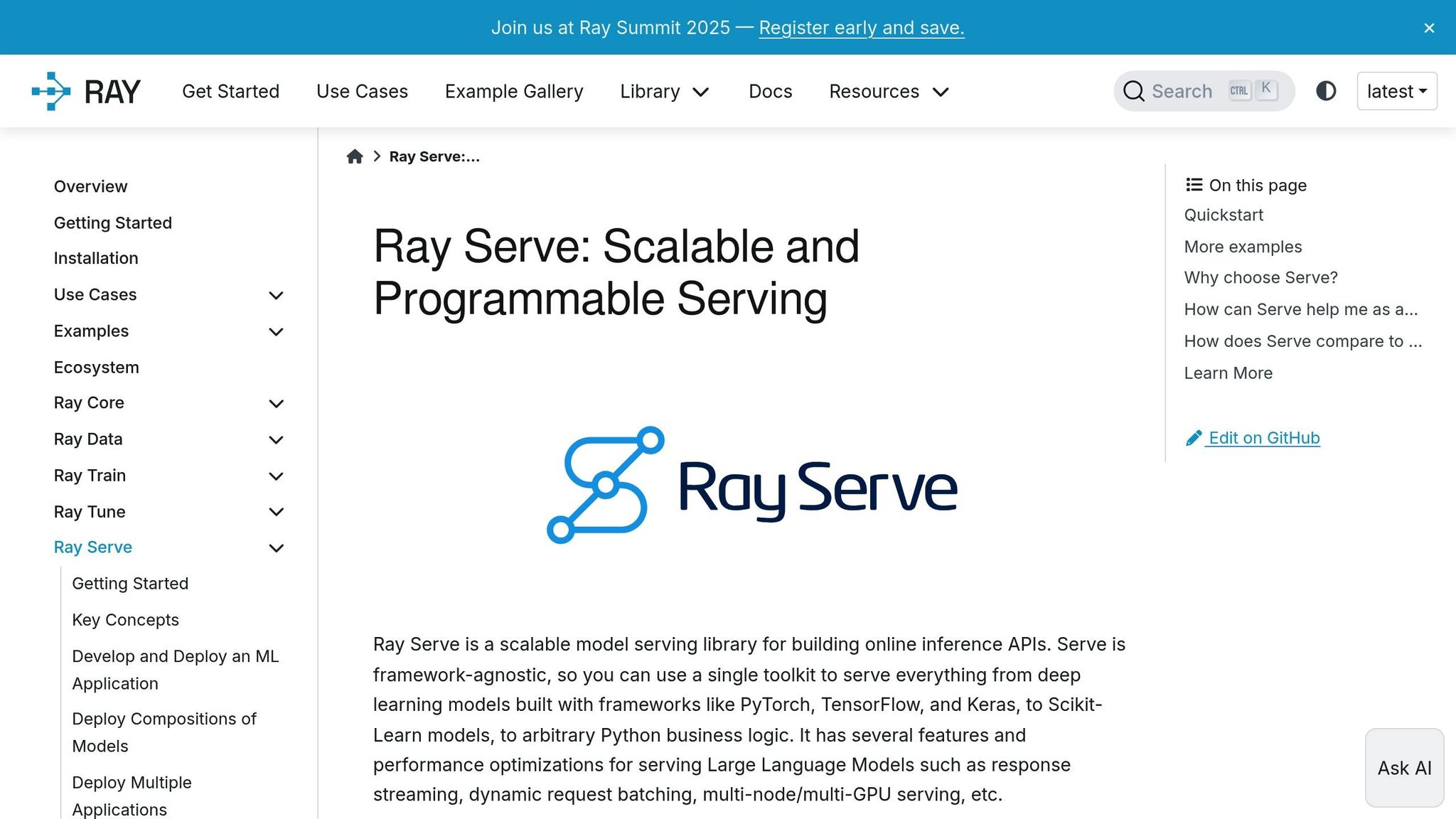
Ray Serve is a library designed for scalable model serving, built on Ray to simplify the deployment of AI models in production. It offers a versatile framework to serve models efficiently, whether for straightforward predictions or more intricate workflows involving multiple models.
Ray Serve brings a range of capabilities tailored for enterprise AI deployments:
Its architecture supports both synchronous and asynchronous serving, making it adaptable to diverse operational needs.
These features make Ray Serve a versatile tool for various business scenarios.
Ray Serve excels in high-performance model serving scenarios, such as:
These use cases highlight how Ray Serve addresses business-specific challenges with ease.
Ray Serve provides key advantages for American enterprises:
By combining scalability and reliability, Ray Serve aligns perfectly with the needs of businesses looking to streamline AI integration.
Ray Serve is open-source software available for free. However, businesses should account for costs tied to cloud infrastructure, such as compute resources and traffic volume. For organizations seeking additional support, enterprise services and managed solutions are available through Anyscale.
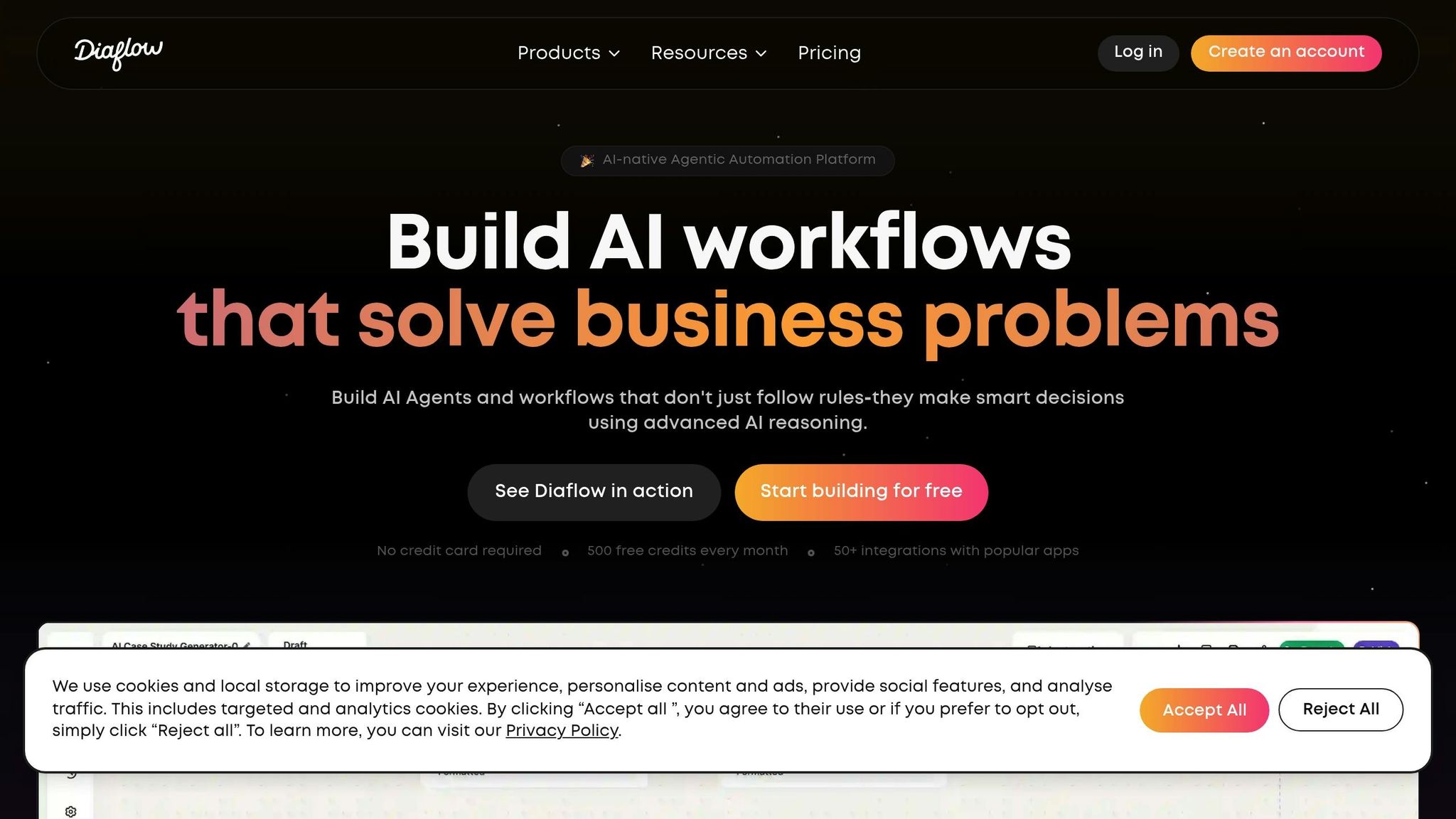
Diaflow serves as an accessible, visual tool designed to simplify the creation and management of AI-driven workflows. This platform allows businesses to streamline their processes using an intuitive drag-and-drop interface, making it suitable for teams with varying levels of technical expertise. As part of the broader suite of AI workflow solutions, Diaflow focuses on making process design and integration straightforward.
Diaflow’s features enable businesses to tackle a range of operational challenges:
Diaflow offers several advantages tailored to the needs of American companies:
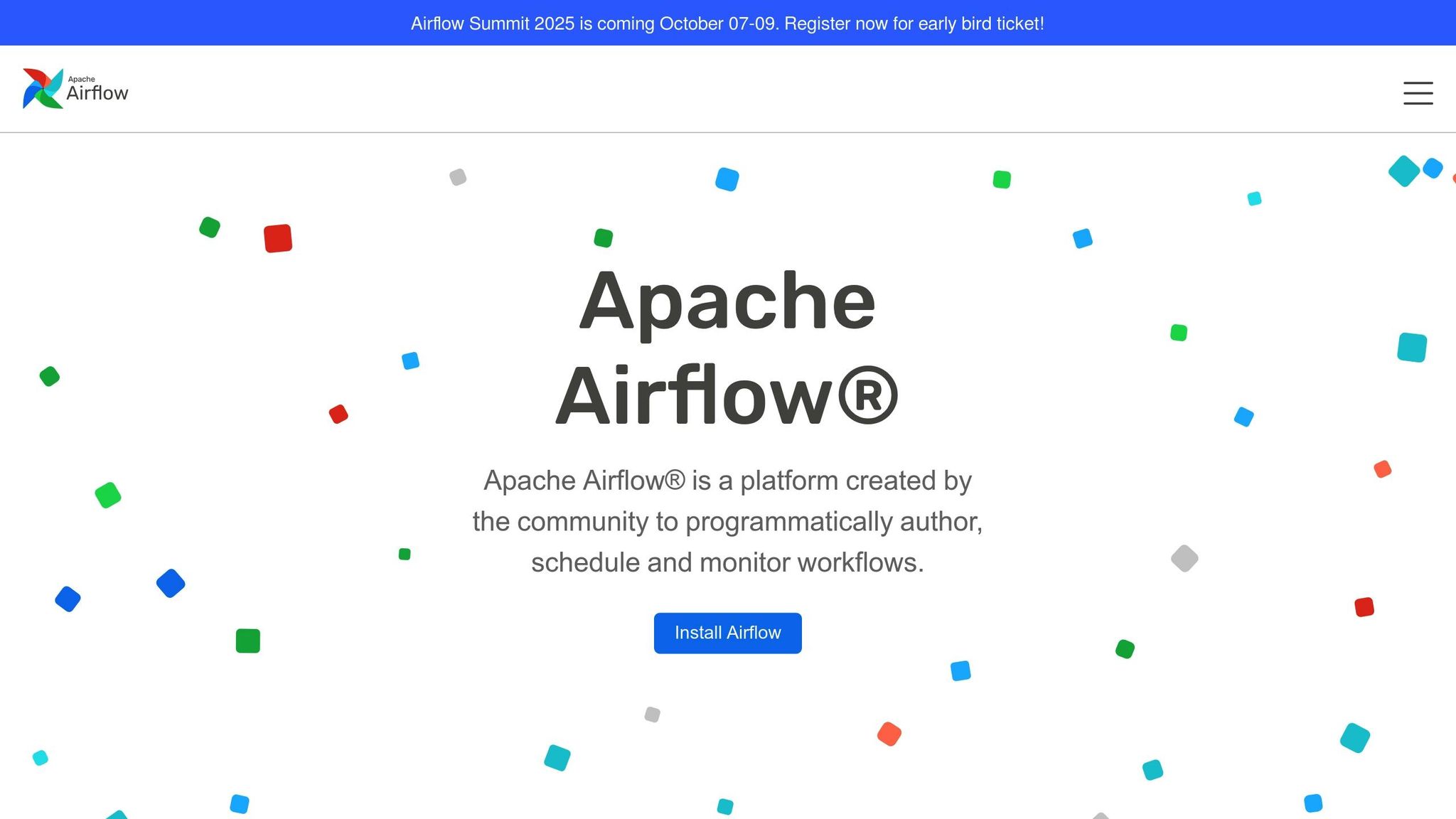
Apache Airflow is an open-source platform designed to orchestrate data workflows and automate tasks. It works hand-in-hand with other AI automation tools, offering a scalable and transparent way to manage data pipelines. By scheduling, monitoring, and managing workflows as Directed Acyclic Graphs (DAGs), Airflow simplifies the visualization and control of complex business processes. It integrates effortlessly into modern AI workflows, making it a key component for many organizations.
Apache Airflow is free to use, with no licensing fees. However, organizations must cover the costs of the infrastructure and operations required to run it. For those seeking managed services, major cloud providers offer hosted options, with pricing depending on the scale of deployment and specific needs.
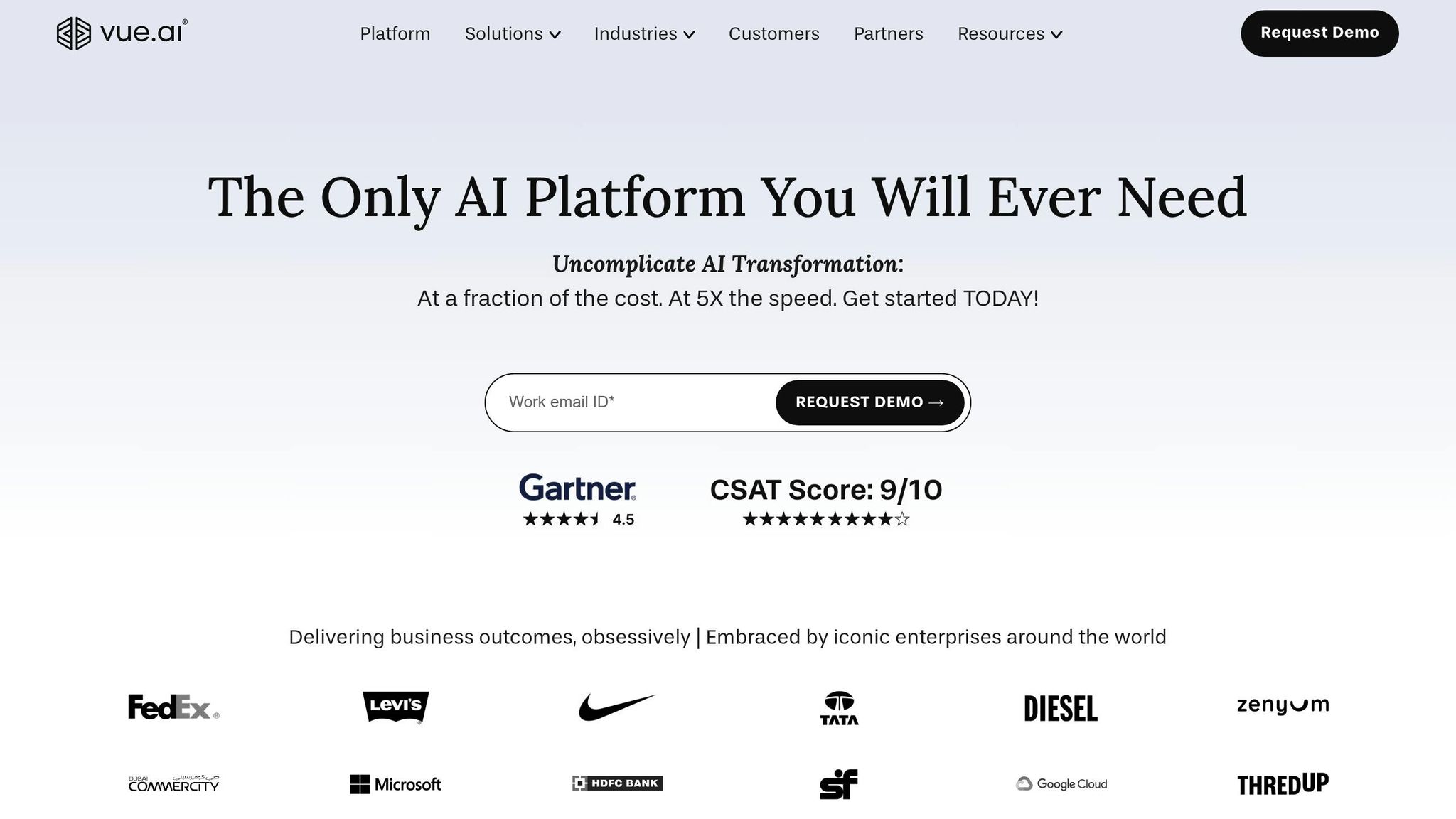
Vue.ai is a platform designed to simplify and speed up AI adoption for enterprises. Its modular design combines workflow automation with advanced machine learning, offering a single solution that delivers value quickly. By enabling rapid deployment, Vue.ai helps businesses achieve results without lengthy implementation timelines.
This platform connects technical and business teams through a low-code interface for operations and a powerful data platform for AI experts. This dual functionality promotes smooth collaboration across the entire process, from preparing data to deploying AI models. Vue.ai supports streamlined document processing and offers solutions that work across industries.
Vue.ai's Intelligent Document Processing (IDP) solution uses computer vision and natural language processing (NLP) to automate document handling. It can process invoices, contracts, forms, and other business documents, while also allowing businesses to create custom workflows tailored to their needs. With integrations covering over 200 data sources, Vue.ai breaks down the data silos that often hinder enterprise AI projects.
The platform's multi-cloud compatibility ensures it works across various cloud environments with minimal setup. This flexibility is especially valuable for businesses using hybrid cloud systems or planning cloud migrations. Vue.ai’s automation capabilities also adapt to changing business conditions, reducing the need for manual adjustments.
Additionally, generative AI workflows are embedded into the platform, enabling tasks like content creation, data enrichment, and automated decision-making. Pre-built templates for common business scenarios let teams launch AI projects more efficiently, bypassing the need to start from scratch.
Vue.ai’s integrated design reduces inefficiencies, eliminates data silos, and boosts operational performance.
Vue.ai's features support a variety of practical applications across industries:
Vue.ai delivers measurable improvements in business performance. Enterprises using the platform report 30% higher data accuracy, 40% lower processing costs, and workflows that are four times faster. These gains translate into significant savings and operational enhancements.
The platform’s quick deployment process stands out, with businesses achieving a pilot go-live in 30 days, ROI proof in 60 days, and full-scale implementation within 90 days. This is a stark contrast to traditional AI implementations, which can take over a year to yield results.
In the eCommerce sector, users have seen a 40% boost in conversion rates, an 85% reduction in time to market, and a 30% increase in unique product views. On top of that, teams save an average of 27 hours per person each week, freeing them to focus on strategic initiatives rather than repetitive tasks.
Customer satisfaction is another highlight, with 96% of Vue.ai clients viewing the platform as a 'Strategic Partner'. This high satisfaction rate reflects the platform's ability to adapt to changing business needs while consistently delivering results.
Vue.ai offers tailored pricing plans based on factors like business size, deployment scale, and required features. Flexible pricing structures allow companies to start with pilot projects to demonstrate ROI before expanding to larger deployments. For detailed pricing options, businesses are encouraged to contact Vue.ai’s sales team to develop a solution that fits their budget and technical needs.
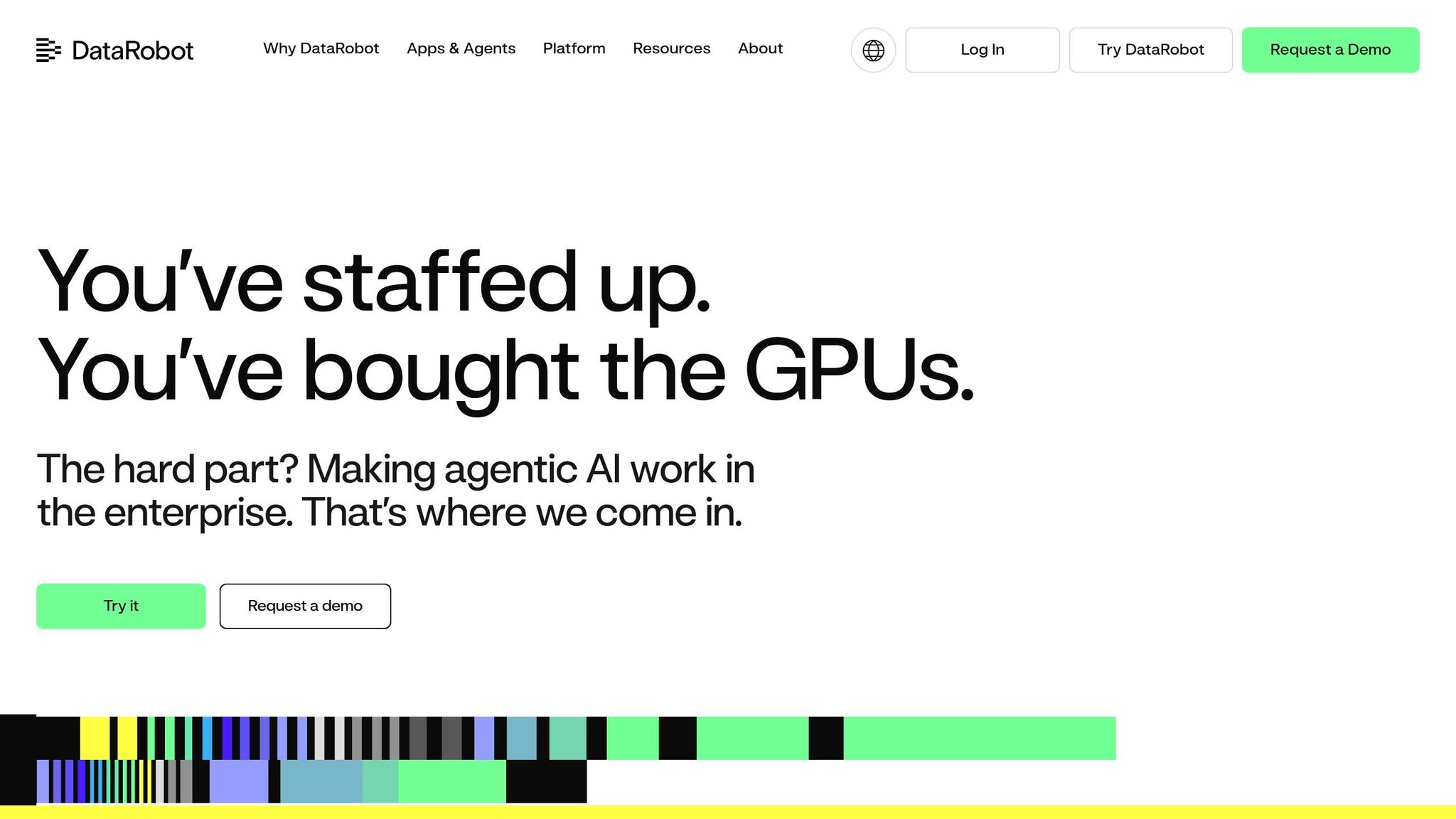
DataRobot brings together the entire machine learning lifecycle - from preparing data to deploying models - into one cohesive platform. By bridging the gap between data scientists, developers, and IT teams, it eliminates silos and simplifies workflows. It supports both predictive and generative AI, consolidating multiple tools into a single, streamlined solution.
Here’s a closer look at some of its standout features:
DataRobot simplifies the often-complex process of preparing data for machine learning. It handles tasks like data wrangling, joining, aggregating, and transforming, either directly within cloud data warehouses or through its DataRobot AI Catalog, which offers advanced browsing and preview tools.
Its Automated Feature Engineering & Discovery takes raw data and uncovers new insights by automatically identifying, creating, and refining features. This process generates datasets that might otherwise go unnoticed, saving time and boosting accuracy.
The platform’s AutoML functionality evaluates and recommends the best models for a given task. It tests a wide variety of algorithms - both open-source and proprietary - and suggests the optimal performer, reducing the guesswork in model selection.
With its Explainable AI (XAI) tools, DataRobot makes it easier to understand how models arrive at their conclusions. Features like SHAP explanations, individual prediction insights, Feature Impact analysis, and Feature Effects visualization provide transparency, helping teams identify the key factors driving results.
DataRobot also shines in Model Comparison & Optimization, allowing teams to evaluate multiple predictive models across experiments. Even when working with different datasets and parameters, the platform aids decision-making with tools like an enhanced confusion matrix and a tailored time series experience to assess model performance.
Selecting the right AI solution hinges on various factors, from technical capabilities to budget and compliance needs. Below is a side-by-side comparison of popular platforms to help simplify your decision-making process.
| Platform | Key Features | Pricing (USD) | Target Business Size | Security & Compliance | Best For |
|---|---|---|---|---|---|
| Prompts.ai | 35+ LLMs, FinOps cost controls, enterprise governance, prompt workflows | Pay-as-you-go from $0/month, Business plans $99-$129/member/month | Small teams to Fortune 500 | Enterprise-grade security, audit trails, data governance | Unified AI orchestration, cost optimization |
| Domo | Real-time dashboards, cloud data integration, mobile BI | Custom pricing starting at $83/user/month | Mid-market to enterprise | SOC 2 Type II, GDPR compliant | Business intelligence, data visualization |
| Prefect | Workflow orchestration, Python-native, observability | Cloud: $39/user/month, Enterprise: Custom | Startups to large enterprises | SOC 2, GDPR, role-based access | Data pipeline automation |
| Metaflow | ML lifecycle management, AWS/Azure integration, versioning | Open source free, Enterprise: Custom | Data science teams, enterprises | Cloud-native security, IAM integration | Machine learning workflows |
| Kubeflow | Kubernetes-native ML, multi-framework support, pipelines | Open source free, managed services vary | Tech-savvy organizations | Kubernetes security model, RBAC | Container-based ML operations |
| Ray Serve | Distributed ML serving, auto-scaling, multi-model | Open source free, Anyscale: $1.20+/compute unit/hour | Startups to enterprises | Encryption in transit/rest, VPC support | High-performance model serving |
| Diaflow | Chatbot creation and voice assistant workflows | Freemium, Pro plans from $29/month | Small to medium businesses | Ensuring secure data transfers | Chatbot development, voice assistants |
| Apache Airflow | Task scheduling, workflow automation, extensible | Open source free, managed services $200+/month | All sizes | Configurable security, LDAP/OAuth | Data pipeline orchestration |
| Vue.ai | Retail AI, personalization, visual search | Custom pricing starting at $10,000/month | Mid-market to enterprise retail | SOC 2, GDPR, PCI DSS | E-commerce optimization, retail analytics |
| DataRobot | AutoML, predictive analytics, AI-powered business intelligence | Custom pricing starting at $50,000/year | Enterprise organizations | FedRAMP, SOC 2, ISO 27001 | Automated machine learning, predictive analytics |
This table condenses critical details for a quick comparison, helping you focus on platforms that meet your business needs.
Enterprise-Ready Solutions like Prompts.ai and DataRobot provide robust governance tools and predictive analytics. Prompts.ai is especially noteworthy for unifying multiple AI tools into a single platform, potentially slashing costs by up to 98%.
Open Source Solutions such as Apache Airflow, Kubeflow, and Metaflow offer flexibility and cost efficiency but require strong technical expertise for setup and management. These platforms are ideal for engineering-driven teams capable of handling infrastructure customization.
Specialized Tools like Vue.ai and Diaflow excel in niche areas. Vue.ai focuses on retail optimization, while Diaflow is tailored for conversational AI. While highly effective in their domains, their use cases are limited outside these specialties.
Cloud-Native Services such as Domo and Prefect combine user-friendly interfaces with powerful functionality, making them a good fit for organizations seeking managed solutions without heavy technical overhead.
When evaluating these platforms, weigh your team’s technical expertise, budget, compliance obligations, and specific goals. Pricing structures vary widely - from pay-as-you-go options to significant enterprise-level investments - so it’s essential to account for both initial costs and long-term scalability. This comparison provides a solid foundation for exploring the best platform to meet your business needs.
As outlined, every platform brings distinct advantages tailored to varying business needs. The key lies in selecting an AI solution that aligns with your goals, technical expertise, and overall strategy. This guide has emphasized essential factors like cost, compliance, and technical compatibility to aid in your decision-making process.
When it comes to budgeting, pricing models play a critical role. Pay-as-you-go options, such as Prompts.ai, let you scale costs with usage, while enterprise-level solutions like DataRobot require a larger investment but provide comprehensive AutoML capabilities.
For businesses in regulated industries within the U.S., prioritizing compliance and security is non-negotiable to protect sensitive data effectively.
Your choice of platform should also reflect your team’s technical expertise. Open-source tools like Apache Airflow and Kubeflow are great for flexibility and cost savings but require a robust engineering team to manage them. On the other hand, managed services like Domo and Prefect reduce technical complexity, making them ideal for teams with limited engineering resources. Unified platforms can simplify workflows, cut costs significantly, and consolidate tools, while niche solutions like Vue.ai for retail or Diaflow for conversational AI shine in specialized areas.
A successful AI strategy begins with identifying specific challenges, starting with small pilot projects, and scaling based on measurable results. Consider your organization’s growth plans, existing tech stack, and team capabilities to ensure the solution you choose not only addresses current needs but also adapts to future advancements in AI. The right platform should empower your business to overcome today’s challenges and thrive as new opportunities arise.
To protect sensitive information and meet regulatory requirements when leveraging AI solutions, businesses should focus on core practices such as data encryption, secure data tracking, and regular security audits. These steps are crucial for maintaining the integrity and confidentiality of data.
Equally important is choosing AI tools that are built to comply with regulations like GDPR, CCPA, or HIPAA. Adopting privacy-by-design principles and ensuring that security protocols are consistently updated can strengthen defenses against potential risks. By embedding these safeguards into their operations, companies can seamlessly integrate AI technologies while upholding strong data security and compliance standards.
Switching to a unified AI platform such as Prompts.ai can dramatically cut expenses for businesses. By bringing together various tools under one roof, companies can avoid the high costs of multiple licensing fees and the hassle of juggling several separate subscriptions.
Beyond cost savings, these platforms simplify workflows and reduce administrative burdens, offering a more efficient way to boost productivity and streamline operations. In fact, some businesses have reported cutting costs by as much as 80% after making the switch to an integrated AI solution.
Tools such as Domo and Prefect are transforming how businesses operate by harnessing real-time data and automation to enhance decision-making and streamline processes. Domo excels in integrating and visualizing data, making it easier for businesses to track key performance indicators (KPIs) and make quicker, well-informed decisions. It also reduces the time spent on manual reporting, freeing up resources for more strategic tasks.
On the other hand, Prefect focuses on automating workflows and using predictive modeling to improve productivity while reducing risks. By automating repetitive tasks and offering actionable insights, both tools enable organizations to embrace data-driven approaches that boost efficiency and adaptability in today's fast-paced environment.


